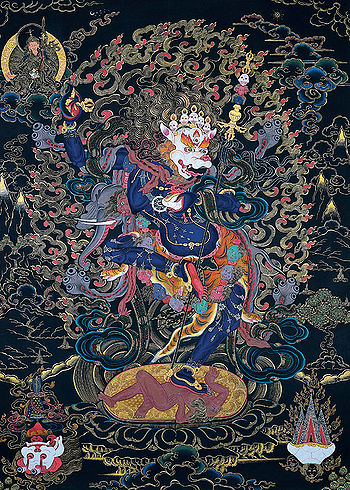Senge Dongma: Difference between revisions
Jump to navigation
Jump to search
No edit summary |
|||
| (One intermediate revision by one other user not shown) | |||
| Line 7: | Line 7: | ||
*Kyabjé [[Dudjom Rinpoche]], Laugeral, Dordogne, August 1982 | *Kyabjé [[Dudjom Rinpoche]], Laugeral, Dordogne, August 1982 | ||
*[[Yangthang Rinpoche]], [[Lerab Ling]], 8th August 2012 | *[[Yangthang Rinpoche]], [[Lerab Ling]], 8th August 2012 | ||
*[[Khenchen Pema Sherab]], Rigpa London centre, UK, 21 May 2018 | |||
==Notes== | ==Notes== | ||
| Line 16: | Line 17: | ||
==External Links== | ==External Links== | ||
*[http://www.himalayanart.org/pages/simhamukha/index.html Outline page at Himalayan Art] | *[http://www.himalayanart.org/pages/simhamukha/index.html Outline page at Himalayan Art] | ||
*{{LH|topics/simhamukha|Texts related to Senge Dongma}} | *{{LH|topics/simhamukha|Texts related to Senge Dongma on Lotsawa House}} | ||
[[Category:Buddhas and Deities]] | [[Category:Buddhas and Deities]] | ||
Revision as of 11:57, 19 December 2018

Senge Dongma (Tib. སེང་གེ་གདོང་མ་, Wyl. seng ge gdong ma; Skt. Siṃhamukhā[1] or Siṃhavaktrā[2]) — the lion-faced dakini. In the Nyingma terma tradition, she is considered as one of the many forms of Padmasambhava, specifically a secret form of Guru Rinpoche manifested to avert spiritual obstacles and negativity.
In the Sarma traditions she arises out of the Chakrasamvara cycle of tantras and belongs to the Anuttarayoga 'wisdom' classification.[3]
Empowerments Given to the Rigpa Sangha
- Kyabjé Dudjom Rinpoche, Laugeral, Dordogne, August 1982
- Yangthang Rinpoche, Lerab Ling, 8th August 2012
- Khenchen Pema Sherab, Rigpa London centre, UK, 21 May 2018
Notes
- ↑ Sometimes rendered as: Singhamukha.
- ↑ Philippe Cornu, Dictionnaire Encyclopédique du Bouddhisme, p. 534.
- ↑ http://www.himalayanart.org